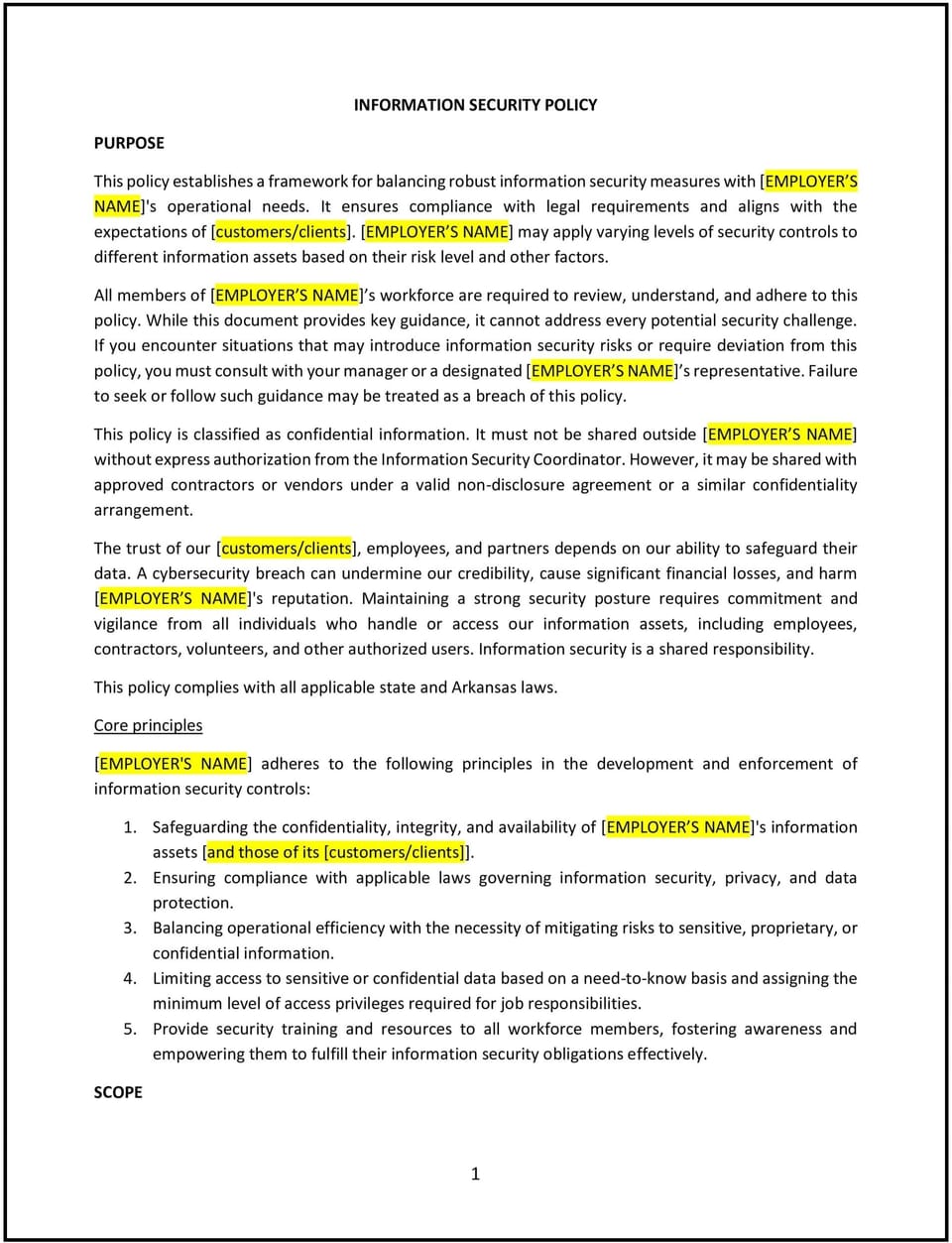Information security policy (Arkansas): Free template

Information security policy (Arkansas)
In Arkansas, an information security policy provides businesses with a framework for protecting sensitive data, safeguarding systems, and ensuring compliance with data protection regulations. This policy outlines the responsibilities of employees, security protocols, and procedures for managing potential threats.
By implementing this policy, Arkansas businesses can mitigate cybersecurity risks, enhance trust with customers and partners, and support compliance with applicable state and federal regulations, such as the Gramm-Leach-Bliley Act (GLBA) or Arkansas’s data breach notification laws.
How to use this information security policy (Arkansas)
- Define security protocols: Clearly outline procedures for safeguarding sensitive data, including encryption, access controls, and secure storage.
- Assign responsibilities: Specify the roles of employees and IT personnel in maintaining information security and responding to incidents.
- Establish data classification: Identify different types of data (e.g., public, confidential, sensitive) and the security measures required for each category.
- Develop incident response procedures: Provide guidelines for detecting, reporting, and managing security breaches to minimize impact.
- Provide training: Educate employees on best practices for information security, such as recognizing phishing attempts and using strong passwords.
Benefits of using this information security policy (Arkansas)
This policy offers several advantages for Arkansas businesses:
- Reduces cybersecurity risks: Protects systems and data from unauthorized access, theft, or breaches.
- Enhances trust: Demonstrates the business’s commitment to safeguarding sensitive information, building trust with customers and stakeholders.
- Supports compliance: Aligns with Arkansas-specific regulations and federal laws to ensure legal and regulatory adherence.
- Improves response readiness: Establishes clear procedures for managing security incidents, minimizing potential damage and downtime.
- Promotes accountability: Clarifies employee and management roles in maintaining a secure workplace.
Tips for using this information security policy (Arkansas)
- Address Arkansas-specific considerations: Incorporate state laws governing data protection and breach notifications into the policy.
- Implement monitoring tools: Use software solutions to detect and respond to potential security threats in real-time.
- Conduct regular audits: Periodically review security practices to identify vulnerabilities and ensure compliance with the policy.
- Update regularly: Revise the policy to reflect changes in technology, regulations, or business needs.
- Communicate expectations: Ensure all employees understand their role in maintaining information security and complying with the policy.
Q: How does this policy benefit the business?
A: This policy reduces cybersecurity risks, protects sensitive data, and ensures compliance with Arkansas and federal data protection laws, safeguarding the business’s reputation and operations.
Q: What steps should the business take to protect sensitive information?
A: The business should implement encryption, restrict access to sensitive data, regularly update security systems, and educate employees on security protocols.
Q: How does this policy support compliance with Arkansas laws?
A: The policy aligns with Arkansas data protection regulations, such as breach notification laws, and federal standards like the GLBA, ensuring legal adherence.
Q: What should the business do in the event of a data breach?
A: The business should follow the incident response procedures outlined in the policy, including containing the breach, notifying affected parties, and reporting to the appropriate authorities.
Q: How can the business ensure ongoing compliance with this policy?
A: The business can conduct regular audits, provide employee training, and stay updated on changes in data protection laws to maintain compliance.
This article contains general legal information and does not contain legal advice. Cobrief is not a law firm or a substitute for an attorney or law firm. The law is complex and changes often. For legal advice, please ask a lawyer.


